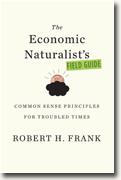The Economic Naturalist's Field Guide
Robert H. Frank
book reviews:
· general fiction
· chick lit/romance
· sci-fi/fantasy
· graphic novels
· nonfiction
· audio books
· author interviews
· children's books @
curledupkids.com
· DVD reviews @
curledupdvd.com
newsletter
win books
buy online
links
home
for authors
& publishers
for reviewers

 |
The Economic Naturalist's Field Guide: Common Sense Principles for Troubled Times Robert H. Frank Basic Books Hardcover 240 pages May 2009 |
|
When one ponders the leading public policy issues of the day - the bailout of the banking and the automobile sectors of our economy by the Obama administration, the way in which we might come to an agreement on health care that will cut costs and provide universal coverage, and what we as a nation will have to do to come to a sensible agreement on climate change - there is no denying the salience of economics. As John Maynard Keynes—arguably the most influential economist of the twentieth century—once said correctly, “The ideas of economists and political philosophers, both when they are right and when they are wrong, are more powerful than is commonly understood. Indeed the world is ruled by little else.”This notwithstanding, it is also true that the general public frequently finds economic logic and principles difficult to fathom and hence this public often views economists and their pronouncements with some suspicion.
We know that the George W. Bush administration did a lot to provide tax cuts for the wealthiest Americans. However, did the Bush tax cuts actually help the rich? This weighty question is analyzed by Frank in simple but not simplistic terms. As he points out, although these tax cuts have permitted the wealthy to buy more and bigger things, these purchases have had little impact. Focusing specifically on home purchases, Frank rightly points out that, “for the wealthy in particular, when everyone has a larger house, the primary effect is merely to redefine what qualifies as an acceptable dwelling” (p. 11). Therefore, he concludes that “even the wealthy have been made worse off, on balance, by recent tax cuts” (p. 11). Do we need bigger cars or better schools? Frank sheds light on this question by first taking issue with the common conservative contention that public expenditures are typically wasteful and that the private sector almost always would use the same resources more efficiently. He points out that additional tax cuts would worsen an already serious imbalance in the overall mix of things Americans buy. Arguing for better schools, Frank perspicaciously notes that a family can choose how much it would like to spend but it cannot choose how much others spend. Therefore, a middle income family that buys a smaller than average house generally will have to send its children to below average schools. The general lesson is that spending “less—on bombs or on personal consumption—frees up money for other pressing uses, but only if everyone does it” (p. 66). A winner-take-all market is one in which “small differences in performance (or even small differences in the credentials used to predict performance) translate into extremely large differences in reward” (p. 144). Frank tells us that although these kinds of markets are common in entertainment and sports, new technologies—such as voice cloning—are permitting such markets to emerge in other sectors of the economy as well. This matters because the spread of winner-take-all markets “helps explain why almost all recent gains in income and wealth have gone to a relatively small number of people atop the economic pyramid” (p. 147). In conclusion, it should be noted that specific aspects of this book can be quibbled with. Three examples follow. First, Frank’s analysis of the reasons for John Kenneth Galbraith not winning a Nobel Prize fails to mention the qualitative nature of Galbraith’s work and how this played out among the mandarins of a profession that has increasingly adopted a mathematical mode of expression as its preferred mode of expression. Second, Frank sometimes de-emphasizes the administrative costs associated with some of his preferred courses of action. Third, when discussing his preferred pricing plan for restaurants on different days of the week, Frank neglects to mention that it would be economically counterproductive for a single restaurant owner, acting in “isolation,” to price meals the way Frank suggests. These caveats notwithstanding, I would be remiss in my duties if I did not say that this is a fine book that clearly shows that careful benefit-cost analysis is almost always the right way to approach decision-making and that a relatively small number of basic principles are able to shed light on most economic issues that confront us in our lives. Originally published on Curled Up With A Good Book at www.curledup.com. © Amitrajeet A. Batabyal, 2009 |
| Also by Robert H. Frank: |
|
|
|
 Click here to learn more about this month's sponsor! |
|
| fiction · sf/f · comic books · nonfiction · audio newsletter · free book contest · buy books online review index · links · · authors & publishers reviewers |
|
| site by ELBO Computing Resources, Inc. | |
 Given this state of affairs, if the power and the reach of economic analysis is to be broadly appreciated, then what we need is an economist who writes clearly and is able to cogently explain how economic analysis, when correctly used, can shed useful light on all manner of ills that plague our contemporary society. Robert H. Frank is that economist, and in
Given this state of affairs, if the power and the reach of economic analysis is to be broadly appreciated, then what we need is an economist who writes clearly and is able to cogently explain how economic analysis, when correctly used, can shed useful light on all manner of ills that plague our contemporary society. Robert H. Frank is that economist, and in